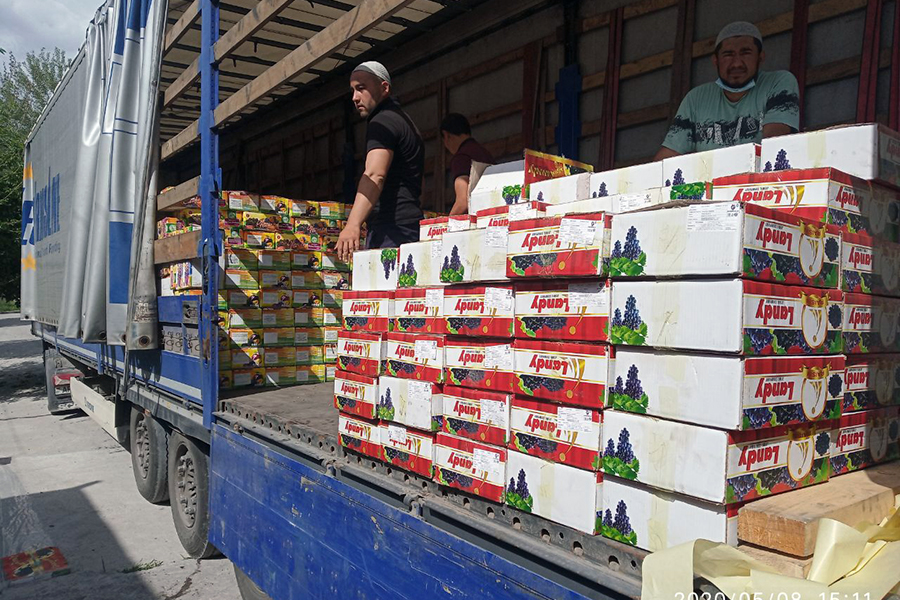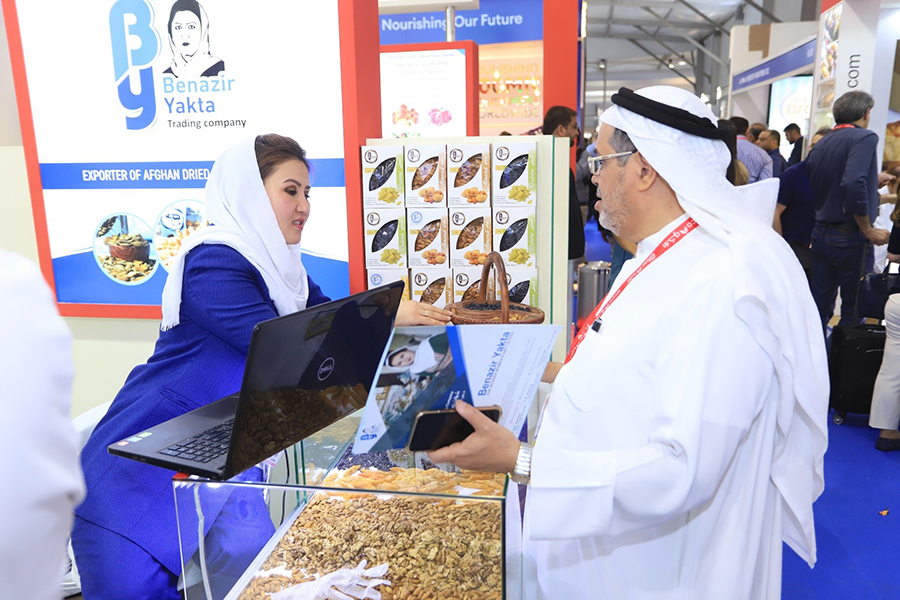DEVELOPMENTS
USAID Projects Assisting Small Firms Affected by COVID-19
May 8, 2020
Even the strongest economies are struggling to cope with the economic impact of the COVID-19 pandemic. China saw its first drop in gross domestic product since 1992 and Germany, Europe’s largest economy, could contract by up to 5.4 percent this year. While it’s too soon to predict how less developed countries will fare, all indicators point to severe challenges.
The fate of small and medium-sized enterprises (SMEs) is a particular concern, given that they account for more than half of total employment in developing nations.
“Small businesses across the developing world are being affected regardless of sector. Urban workers, for example, with work stoppages now may not be able to send back remittances to families in rural areas, which is having negative multiplier effects on household spending that affect countless microenterprises,” said Zaki Raheem, DAI’s Senior Specialist for Enterprise Development and Entrepreneurship. “And while more-established and well-connected small businesses are quickly learning how to sell online, more vulnerable and less tech-savvy small businesses may simply have had supply chains and customer bases cut off and have very limited runways before cash runs out.”
Under the cloud of the COVID-19 crisis, small businesses are letting employees go, losing revenue, and in some cases shutting down operations. But U.S. Agency for International Development (USAID)-funded projects are rapidly deploying solutions to help firms navigate this challenging time.
Shifting Focus
In Uzbekistan, export partners of the USAID’s Agricultural Value Chains Activity (AVC) are applying innovative business strategies to allow for uninterrupted export of agricultural products to foreign markets. When European buyers stopped placing orders due to health concerns, the project team helped local firms shift their exports to the Commonwealth of Independent States (CIS)—Armenia, Azerbaijan, Belarus, Kazakhstan, Kyrgyzstan, Moldova, Russia, Tajikistan, and Uzbekistan. One firm, Garden House LLC, has already exported 60 metric tons of mixed dried fruit products to Belarus, valued at $90,000.
To overcome the movement restrictions within Uzbekistan, Garden House LLC consolidated the shipment and exported directly from Samarkand, where its farmer suppliers are located instead of its usual practice of exporting from Tashkent. Additionally, Garden House incorporated these suppliers as official company affiliates rather than independent contractors, which allowed for their movement between the fields and the consolidation center, according to official rules.

Employees prepare products for shipment. Photo courtesy: Garden House.
“After our European buyers turned down deals due to COVID-19, we decided to put all our efforts to the traditional CIS market,” said Mirzokhid Niyazov, Garden House’s Business Development Manager. “The coronavirus has complicated exports this year, but the project helped us understand and navigate new regulations and brainstorm logistics solutions. With AVC’s help, we were still able to consolidate the shipment in time to meet the buyers needs.”
Another project-supported exporter, Yumuqboy Erkin Farm Enterprise, is preparing a shipment of carrots for export to Russia directly from Altyaryk district in Ferghana region, while Japan Uz Trade LLC is preparing a container of dried fruits and pulses for export to Japan. This shipment has a knock-on effect to other project-supported farm enterprises as many of them supply commodities to Japan Uz Trade.
“Over the past four years, AVC has worked with many exporters to establish domestic supply channels and market linkages to export markets beyond the borders of Uzbekistan, including the three exporters listed above,” said Chief of Party Brian Kiger. “Among our weekly webinars, we included a panel discussion with these successful export partners, to discuss challenges with exports under COVID-19 restrictions, and shared the solutions they used to mitigate those challenges with their peers. Creating a platform for dialogue is one way we are supporting partners to share information and develop joint strategies to maintain Uzbekistan’s horticultural exports during the pandemic.”
Supporting the SME Sector
SMEs make up nearly 98 percent of the total businesses in Rwanda and account for nearly 40 percent of private sector employment. Accordingly, the Feed the Future Rwanda Nguriza Nshore project is evaluating how best to support the private sector and small firms during this difficult time. The project is supporting the Private Sector Federation to survey small firms to better understand how COVID-19 is affecting transaction advisors, financial institutions, nonbank financial institutions, private capital investors, and other small firms.
Once the data is in hand, the team will develop financial products and guarantees to support business during and after the pandemic.
“These activities align with our project’s broader goals of creating a positive business enabling environment so that small firms can access the finance and investment they need to survive and grow, even with global events like COVID-19,” said Chief of Party Mark Rostal.
Demonstrating ingenuity and resilience, project-supported SMEs are rapidly adapting their business models to survive. Masaka Creamery, a producer of high-quality dairy products, has had, like others, to adapt its business model. A major goal for Masaka during the pandemic has been to protect its employees and the smallholder farmers it sources from, particularly given that as part of the company’s social impact model, most of its employees are persons with disabilities, who are already economically vulnerable. To prevent job loss, Masaka shifted rapidly to a home delivery model by establishing an online presence with Nguriza Nshore support.
.jpg)
An employee works at Masaka Creamery in Kigali, Rwanda. Photo courtesy: Sarah Day Smith/USAID.
“Our sales and imports of raw materials were affected by COVID-19, since our customers were not able to move to get our products from the various points of sale,” said Julie Igiraneza, CEO, Masaka Creamery. “We introduced a home delivery option which, although the sales were not as high, enabled us to keep working and pay our staff. Nguriza Nshore’s support specifically in setting up our social media strategy was very key, as it helped us reach customers we wouldn’t have reached otherwise, and kept our business running during the lockdown.”
Another firm, GET IT, a leading distributor of ISO 22000-certified vegetables and fruits to hotels and restaurants in Rwanda, has started home deliveries of produce and other food products, allowing the company to recover some of the losses incurred due to the lockdown as well as offering a solution for people to access fresh food at home. This initiative is also sustaining the livelihoods of numerous farmers who supply the firm.
Keeping Staff Employed
Another agriculture project, Afghanistan Value Chains—High Value Crops (AVC-HVC), has launched two important COVID-19-related efforts to help its partner agribusinesses continue to sell their goods and keep staff employed. The first was to help high-value agriculture exporters sell their goods through one of the only exporting lanes still open to Afghan agricultural exporters: Mazar-e Sharif to Istanbul, via container.
AVC-HVC’s assistance included a per-container stipend to help offset a portion of the 70 percent price increase (imposed by the shipping company) in container transport costs. To qualify for the stipend, exporting Afghan firms that hold the export contracts with Turkish companies must buy at least 50 percent of exported products from other Afghan agribusinesses supported by the project. To maximize awareness of the initiative, AVC-HVC has been coordinating business-to-business digital meetings to broker sales between its firms all over Afghanistan and a few key firms in Mazar-e-Sharif that are buying products for export to Turkey.
“We expect this initiative to result in several million dollars’ worth of exports,” said Chief of Party Juan Estrada-Valle. “This will also support the cashflow of the agribusinesses, enabling them to keep their employees and continue operating.”
AVC-HVC’s second initiative will support women-owned agribusinesses and food processing companies to process excess supplies of unexportable dried fruits and nuts into jams, marmalades, and honey-nut mixes, and to begin providing home delivery of these products across Kabul and large provincial cities.
“This is important because in the context of COVID-19, more than 88 percent of Afghan agricultural exports are not able to leave the country due to border closures, and on top of this, selling these unexportable products domestically has been challenged by traditional market closures due to stay-at-home policies,” said Estrada-Valle. By turning perishables into preserved products and providing home delivery services, these firms can generate sales to help keep their businesses open, employ staff, and reduce food waste.

Benazir Yakta shows her products at a past Gulfood tradeshow, one of the largest food and hospitality exhibitions in the world. Photo courtesy: AVC-HVC.
“In the middle of this COVID-19 crisis, AVC-HVC helped me process some of the product I had in stock for export when the borders closed, into jam for the Ramadan market,” said Benazir Yakta, who owns a trading company in Kabul. “They also helped me advertise my products on social media and now I am dispatching an average of 15 home deliveries a day. I may not make the same profit I would have if I had exported, but I will not lose money and my business and employees will survive the crisis.”
“Our company partners with AVC-HVC and through the partnership we have been able to enter new markets and improve the quality of our raisins,” said Mohammad Shafiq Payam, Vice President of TAK Dry Fruit in Mazar-e-Sharif. “In the midst of the COVID-19 pandemic we are again working closely with AVC-HVC to purchase produce from firms in other parts of the country, which are unable to export. This is allowing smaller firms to strengthen their cashflow and stay in business.”
For more information on how DAI projects are pivoting to support small businesses though the C-19 crisis, contact Colleen Green, Vice President, Economic Growth, at colleen_green@dai.com.